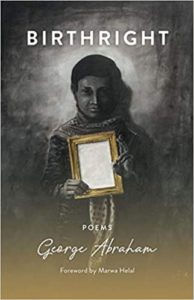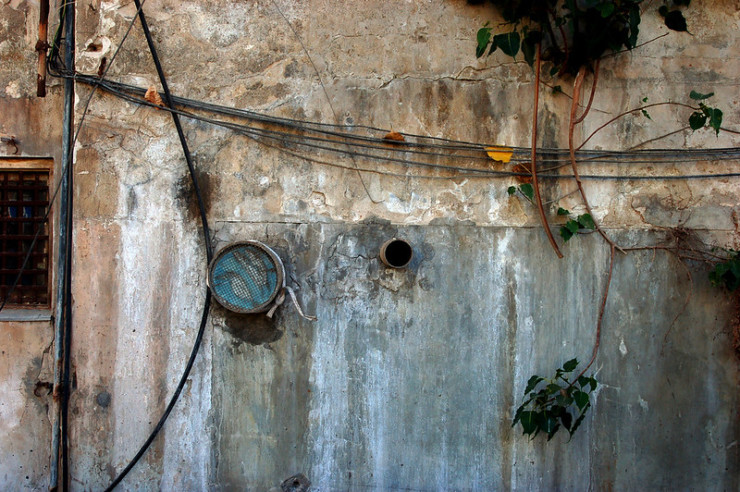In George Abraham’s Birthright, erasure is cleverly appropriated and brandished by the erased. Constructed as a modern art exhibit, this collection coils the chilling parallels of past and present, oppressor and oppressed, redaction and reality into formidable helices. The negative spaces of the annihilated are transposed with the duplicities of the visible subject—an artistic rendering of colonization employed by the colonized:
i contour my face with sand & it is war paint. i puncture my
nostril with steel & that is war crime. a hamsa dangles from my
earlobe & the room empties itself
& here i am. is this what you mean by arab witchcraft? that you could
mistake this skin for anything but mine—& isn’t that the perfect
[ ]? the Queerest [ ]? tell me you didn’t mistake me for the
slowest lullaby & i’ll say: i have so many bodies in me—if you look
close enough,
you could almost mistake me for a massacre.
Utilizing experimental forms, Birthright explores what it means to come from a country that does not exist, to be subjugated by a state that wouldn’t exist today had it not been for the land your ancestors called home, and to grow up in a country that historically did the very same to the West’s indigenous inhabitants. Comparing two countries in different phases of Manifest Destiny, Abraham reveals the unsettling truth that much of the world continues to ignore—that troublesome colonialist mindsets never ceased and the world’s institutions continue to placate the systemically xenophobic; that long after territorial and emotional superposition, the conquerors will continue to whitewash the conquered they wiped off the face of the map; and that conquering, effectively, never concludes but merely transforms. Sifting through the rubble of the Palestinian-Israeli conflict, we bear witness, in real-time, to the eroding of not only the land itself but the ancestral home of countless descendants:
& to that land unearthed, troubled yet fallow,
I sing praise to your rewritten & eroded topography –
To hands that plow & seed a forgotten history,
I sing praise to your calloused & unwounded exterior –
To soil that cradles everything, even in betrayal,
I sing praise to the weight you swallow & inhabit –
I know somewhere, the land sings love to its people
the way street cat howls to moonlight
in lonesome gaze; somewhere, I kiss the Mediterranean
& no one drowns at the intersection of salt & fury;
somewhere, a patient God holds the universe
with our tiny bodies, ravaging in his arms;
somewhere, our children wake up & become music
like dabke was just another word for morning prayer

You begin again, not searching for a center, & from the ash
& soot, a temple. From the temple, empire. From empire,
fire. From fire, multiverse, wingspan, soundless death. There is
a you, you cannot find, outside of you dreaming all of this.
You cannot take root. It’s springtime, & what can you do but look into
eternity’s face & reject it. This is your loneliest sound. You
step into the light, & Forgiveness is a daffodil in a wooded clearing.
You palm the daffodil, inhale it; allow Forgiveness to enter
& your throat ruptures.
George Abraham’s Birthright offers a stirring glimpse of the traumas carried in our blood that generate ripples across space and time. In turns wondrously eloquent and refreshingly acerbic, Birthright swiftly challenges the narrative often spun by the media. An installation of fervent subversion, Abraham’s collection embodies a small reclamation of all that has been lost by the silenced people of Palestine.
Photo by Chany Crystal, Creative Commons license via Flickr. Post by Ali Nuri, author of Rain and Embers.
- Poetry Review: Birthright by George Abraham - March 12, 2020

Maureen says
Wonderful to see you here, Ali.
‘Birthright’ indeed. It’s about the physical place, yes; but also about place as it exists in the mind, imagination, and heart. Art remains the recover-er of voice, at least for the moment.
L.L. Barkat says
What you’ve quoted from these poems is painfully beautiful. I think if we could just speak in poetry and art to one another for a time, that would be really something. We each have our “side” of the story, always. Poetry makes the sides slip away into something both harder and easier to wrap our minds and hearts around. And the heart, that’s what needs touching, especially when we’ve been (and continue to be) wounded or when we’ve enacted (or continue to enact) wounding.